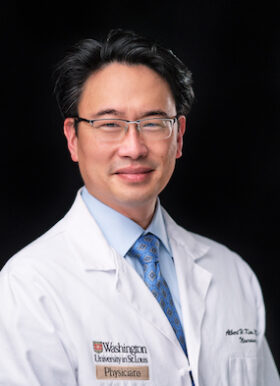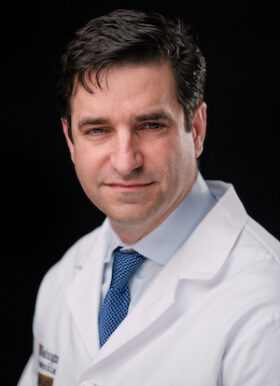The Advanced Surgical Neuro-oncology Fellowship at Washington University School of Medicine, Siteman Cancer Center, and BJC Healthcare offers a one-year program of intensive clinical training.
The program’s mission is to train fellows on the most up-to-date and technologically advanced surgical approaches for the treatment of brain tumors, which will prepare them to use both complex skull base techniques and the emerging surgical technologies that complement comprehensive neuro-oncological care.
One fellow each year will be selected from a highly competitive pool of neurosurgical residents who trained in accredited residency programs in the United States.
Why Washington University School of Medicine?
Most current cranial neuro-oncology fellowships focus on only open skull base or are typically more research driven and do not generally provide a balanced exposure to skull base techniques and advanced neuro-technology, both of which are increasingly required for the comprehensive management of neuro-oncology patients.
Interaction of the fellow with other multidisciplinary neuro-oncology experts at the Brain Tumor Center at Siteman Cancer Center will also provide a comprehensive clinical exposure to confront and effectively treat all forms of intracranial neoplasms.
The fellow will work with the following neurosurgery faculty:
Prior Fellow Graduates
Educational Emphases
Open and Minimally Invasive Skull Base Surgery
One pillar of the fellowship experience will consist of training for advanced techniques in skull base approaches to treat meningiomas, pituitary adenomas, schwannomas, chordomas, and chondrosarcomas. Specifically, the approaches will include cranio-orbitozygomatic, retrosigmoid and presigmoid approaches, petrosal approaches, pineal region approaches, far lateral, and combined approaches.
Emphasis will also be placed on advancing the use of minimally invasive endoscopic approaches including conventional and expanded endonasal transsphenoidal approaches as well as endoscopic-assisted open cases.
The fellow will be expected to attend and help to run the monthly Anterior Skull Base and Pituitary Conference as well as the monthly Lateral Skull Base Conference and attend the weekly Multidisciplinary Tumor Board. The fellow will also participate in and help to lead at least two resident skull base courses, which are already established.
Concurrent with this portion, the fellow will have a clinical research project focused on treatment outcomes for a particular skull base tumor type with an opportunity to study skull base tumor biology in the laboratory if desired by the trainee.
Intrinsic Brain Tumors and Advanced Technology
The second pillar of the fellowship will focus on the treatment of intrinsic tumors such as gliomas and metastases.
The fellow will be trained on the use of the following technologies:
1) MRI-guided laser interstitial thermal therapy (LITT)
2) awake craniotomies employing advanced mapping techniques (real-time intraoperative brain mapping and advanced functional imaging).
Research
The fellow will also pursue research projects, which include clinical outcomes-based studies and/or a laboratory experience studying tumor biology associated with laser therapy or advances in functional imaging.
Education
The fellow will supervise residents and be responsible for the care of patients. The fellow will participate in outpatient clinics, work on operative cases, and occasionally cover general neurosurgery call as the primary treating surgeon.
Eligibility
The fellow
- Must be a trainee in or graduate of an ACGME-approved neurosurgery residency training program
- Must meet the criteria for an unrestricted Missouri medical license
How to apply
- Send cover letter, curriculum vitae and two letters of reference to Michele Bridges, Senior Residency/Fellowship Program Coordinator.
- In-person visit to department
- Interview
Application timeline
- Application period
Washington University accepts applications for the Advanced Surgical Neuro-Oncology Fellowship up until December 31 of the resident’s PGY5 year. - Fellowship interviews
Interviews for prospective fellows occur from May to June of their of PGY5 year. - Residents complete PGY5, PGY6 and PGY7.
- PGY8 Fellowship year
The PGY8 fellowship year begins July 1.
Fellowship directors

Albert H. Kim, MD, PhD
August A. Busch Jr. Professor of Neurological Surgery
Senior Vice-Chair, Department of Neurosurgery
Professor of Neurosurgery, Genetics, Neurology, and Developmental Biology
Director, Brain Tumor Center
Surgical Director, Pituitary Center
Co-Leader, Neurorestorative Therapy Group, Hope Center
Castle Connolly Top Doctor

Eric C. Leuthardt, MD, MBA
Shi H. Huang Professor of Neurological Surgery
Vice-Chair of Innovation, Department of Neurosurgery
Chief, Division of Neurotechnology
Professor of Neurosurgery, Neuroscience, Biomedical Engineering and Mechanical Engineering & Materials Science
Director, Center for Innovation in Neuroscience and Technology
Director, Brain Laser Center
Castle Connolly Top Doctor
Contact
If you have any questions, please contact the Senior Residency/Fellowship Program Coordinator, Michele Bridges, at bmichele@wustl.edu.